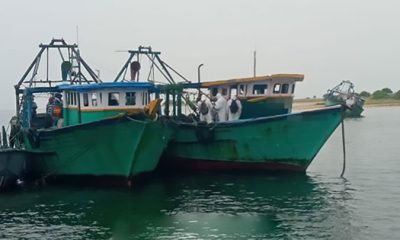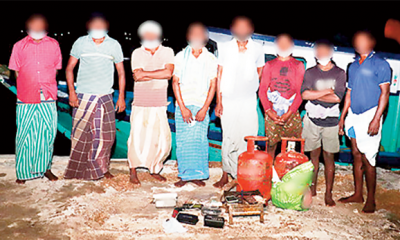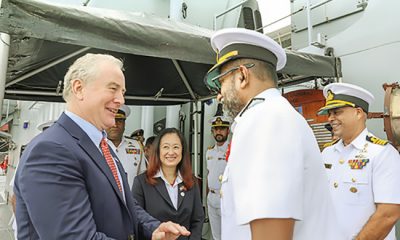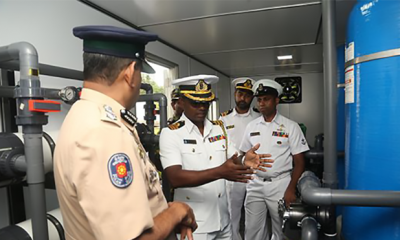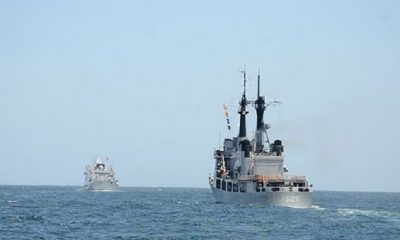News
Navy Commander explains persistent problem of large number of Indian vessels poaching in SL waters
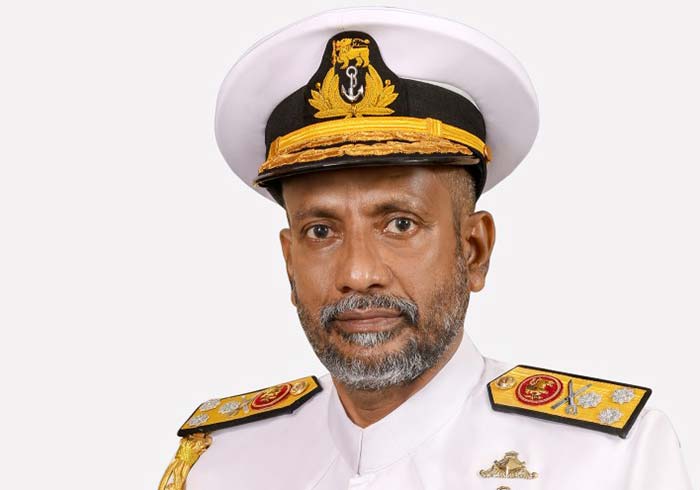
By Rathindra Kuruwita
Sri Lanka has a 5,000-boat strong high seas fishing fleet which can go up to 2,000 nautical miles away from Sri Lanka, Commander of the Navy, Vice Admiral Priyantha Perera said.In contrast, the Indian fishing industry, while not as technologically advanced, has expanded to a point of being unsustainable, he said.
“They have a large number of boats, but they can operate only in their coastal seas and then they poach in our territorial waters using disastrous mechanized bottom trawling techniques,” he said.
Vice Admiral Perera highlighted that the Indian fishing industry has expanded beyond a sustainable capacity. Typically, Indian fishermen, operating within their own waters, are permitted to fish on Saturdays, Mondays, and Wednesdays. He noted that, in a few weeks, they will suspend fishing for a three-month period, allowing fish to breed and replenish the ocean.
“However, Indian fishing boats who claim to engage in high seas fishing face no such restrictions. However, instead of going into the high seas these vessels come to Sri Lankan waters and poach here. The area around Delft Island and in the five to 10 nautical mile shallow seas off Point Pedro have a lot of crabs and prawns. This is a high value yield. Sri Lankan vessels go into the high seas and catch tuna, which brings a lot of money. During meetings with Indian counterparts, our Ministry officials asked Indians why they can’t also follow suit,” he said.
Vice Admiral Perera emphasized that Sri Lankan fishing is subject to rigorous regulations. Fishermen based in Sri Lanka’s North are not equipped for high-seas operations; instead, their focus remains on harvesting prawns and crabs, the Navy commander said.
“Compared to South, East and North Central provinces where fishermen are more likely to engage in high seas fishing, there are only a few fisheries harbours in the North. Myliddy Fishery Harbour is the only place the Northern fishermen must dock large boats. One also needs to have other supporting industries in place for high seas fishing, and these, too, are lacking in the North,” he said.
Indian fishermen also destroy large quantities of equipment of Northern fishermen, he said, adding that he Navy has apprehended 15 Indian trawlers along with 110 of their fishermen in Sri Lankan waters so far in 2024.
“This has not put an end to Indian poaching. When we make arrests, they stop coming for a week or two but return in numbers later. On Saturdays, Mondays, and Wednesdays there are about 400 Indian fishing vessels poaching in Sri Lankan waters around Katchatheevu Island. Another 200 operate around KKS and in the East on those days. So, on average around 600 Indian vessels poach in our waters on Saturdays, Mondays, and Wednesdays. We can’t stop them by using excessive force,” he said.
The Navy commander added that the Navy can’t stop such a large number of Indian vessels with three or four boats. This can only be stopped through a change in the way Indians practice their craft.
“It is not practically possible to seize hundreds of fishing vessels. Also these arrests lead to political implications. We must think of everything.”
The relationship between Indian and Sri Lankan fishermen have deteriorated, too, he said. However, the tensions so far are limited to South India and Sri Lanka’s North.
The Navy commander went on to say that this is not an indication of tensions between India and Sri Lanka. “But the solution to this problem seems far off unless the Indians change their practices,” he said.
News
US sports envoys to Lanka to champion youth development

The U.S. Embassy in Colombo welcomed the U.S. Sports Envoys to Sri Lanka, former National Basketball Association (NBA) and Women’s National Basketball Association (WNBA) players Stephen Howard and Astou Ndiaye, from June 8 through 14.
The Public Diplomacy section of the U.S. Embassy said that it would launch a weeklong basketball program intended to harness the unifying power of sports, made possible through collaboration with Foundation of Goodness and IImpact Hoop Lab.
While in Sri Lanka, Howard and Ndiaye, both retired professional basketball players, will conduct a weeklong program, Hoops for Hope: Bridging Borders through Basketball. The Sports Envoys will lead basketball clinics and exhibition matches and engage in leadership sessions in Colombo and Southern Province for youth aged 14-18 from Northern, Uva, Eastern and Western Provinces, offering skills and leadership training both on and off the court. The U.S. Envoys will also share their expertise with the Sri Lanka Basketball Federation, national coaches, and players, furthering the development of basketball in the country. Beyond the clinics, they will collaborate with Sri Lankan schoolchildren to take part in a community service project in the Colombo area.
“We are so proud to welcome Stephen and Astou as our Sports Envoys to Sri Lanka, to build on the strong people-to-people connections between the United States and Sri Lanka,” said U.S. Ambassador Julie Chung. “The lessons that will be shared by our Sports Envoys – communication, teamwork, resilience, inclusion, and conflict resolution – are essential for leadership development, community building, equality, and peace. The U.S. Sports Envoy program is a testament to our belief that sports can be a powerful tool in promoting peace and unity.”
News
Rahuman questions sudden cancellation of leave of CEB employees

SJB Colombo District MP Mujibur Rahuman in parliament demanded to know from the government the reasons for CEB suspending the leave of all its employees until further notice from Thursday.
MP Rahuman said that the CEB has got an acting General Manager anew and the latter yesterday morning issued a circular suspending leave of all CEB employees with immediate effect until further notice.
“We demand that Minister Kanchana Wijesekera should explain this to the House. This circular was issued while this debate on the new Electricity Amendment Bill was pending. There are many who oppose this Bill. The Minister must tell parliament the reason for the urge to cancel the leave of CEB employees,” the MP said.However, Speaker Mahinda Yapa Abeywardena prevented Minister Wijesekera responding to the query and said that the matter raised by MP Rahuman was not relevant.
News
CIPM successfully concludes 8th Annual Symposium

The Chartered Institute of Personnel Management (CIPM) successfully concluded the 8th Annual CIPM Symposium, which took place on 31st May 2024. Themed “Nurturing the Human Element—Redefining HRM in a Rapidly Changing World,” the symposium underscored the pivotal role of human resource management (HRM) in today’s dynamic global landscape. Since its inception in 1959, CIPM has been dedicated to advancing the HR profession through education, professional development, and advocacy, solidifying its position as Sri Lanka’s leading professional body for HRM.
Ken Vijayakumar, the President of the CIPM, graced the occasion as the chief guest. The symposium commenced with the welcome address by the Chairperson, Prof. Arosha Adikaram, followed by the Web Launch of the Symposium Proceedings and Abstract Book by the CIPM President. The event featured distinguished addresses, including a speech by Chief Guest Ken Vijayakumar, President of CIPM, and an address by Guest of Honor Shakthi Ranatunga, Chief Operating Officer of MAS Holdings Pvt. Ltd., Sri Lanka.
The symposium also featured an inspiring keynote address by Prof. Mario Fernando, Professor of Management and Director of the Centre for Cross Cultural Management (CCCM) at the University of Wollongong, Australia.
Vote of Thanks of the inauguration session was delivered by Dr. Dillanjani Weeratunga, Symposium Co-chair.
The symposium served as a comprehensive platform for researchers to present their findings across a wide range of critical topics in HRM. These included Cultural Diversity and Inclusion, Talent Development and Retention, Ethical Leadership and Corporate Social Responsibility, Adapting to Technological Advancements, Mental Health and Well-being at Work, Global Workforce Challenges, Employee Empowerment, and Reskilling and Upskilling.
The plenary session was led by Prof. Wasantha Rajapakse. Certificates were awarded to the best paper presenters during the valedictory session, followed by a vote of thanks delivered by Kamani Perera, Manager of Research and Development.
The annual symposium of CIPM was a truly inclusive event, attracting a diverse audience that spanned undergraduates, graduates, working professionals, research scholars and lecturers. This widespread interest highlights the symposium’s significance in the field of HRM, offering a unique opportunity for everyone to network and learn from scholarly brains.The CIPM International Research Symposium was sponsored by Hambantota International Port, Sri Lanka Institute of Information Technology (SLIIT), E B Creasy & Co. PLC, and Print Xcel Company.


